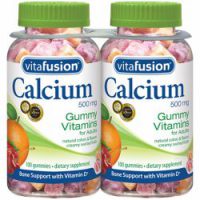 Here’s a common question – ‘What is the best calcium supplement for women?’ Well actually, the best calcium supplement for women, or anyone else for that matter, is probably not calcium at all! The correlation between two vital minerals, calcium (Ca) and magnesium(Mg), is so important that I want to tell you about the serious significance of an imbalance between these two alkaline metals.
Here’s a common question – ‘What is the best calcium supplement for women?’ Well actually, the best calcium supplement for women, or anyone else for that matter, is probably not calcium at all! The correlation between two vital minerals, calcium (Ca) and magnesium(Mg), is so important that I want to tell you about the serious significance of an imbalance between these two alkaline metals.
A dangerous imbalance
There is invariably a serious imbalance stacked against Mg, with too much Ca intake nearly always being the case. It is more likely that Ca is in abundance in comparison to very little Mg and Ca without Mg can have devastating affects on your health.
RDA Guidelines?
 The many different RDAs (recommended daily allowance) come to an average of 5.32 Ca to 1 Mg, with recommended levels of 8 Ca to 1 Mg for children aged 1 – 8 years. This is just the time when good levels of Mg are vital. Young children need high Mg levels to help with brain development and bone growth apart from the vital organs that obviously need to be growing healthily. These RDAs actually increase the Ca to Mg ratio to dangerous levels.
The many different RDAs (recommended daily allowance) come to an average of 5.32 Ca to 1 Mg, with recommended levels of 8 Ca to 1 Mg for children aged 1 – 8 years. This is just the time when good levels of Mg are vital. Young children need high Mg levels to help with brain development and bone growth apart from the vital organs that obviously need to be growing healthily. These RDAs actually increase the Ca to Mg ratio to dangerous levels.
Mg deficiency is an epidemic
There is no doubt that Mg deficiency is an epidemic in these modern times and those deciding the amounts of Ca and Mg we should take have got no clue and have not kept up with research on this dangerous ratio. The public look to these figures to guide them and they are being guided erroneously. Are these guidelines set down by the pharmaceutical companies or perhaps the food manufacturers?
 Calcium Adverts
Calcium Adverts
Have you noticed how often you are told that a food has plenty of Ca in it, for strong bones and healthy teeth? All the adverts on the TV stress how much Ca is in their food products, especially childrens’ foods like, milk, yoghurts, cheeses and Ca rich snacks to take for school lunches. Many of our foods are fortified with Ca. Orange juices have Ca added to them.
Too much calcium causes weak bones!
The elderly are advised to take Ca supplements to avoid bone fractures, especially broken hips. As they age, they are told to take even more Ca and this is very dangerous advice. No wonder so many of our elderly suffer with broken bones as they get older. A broken hip in an elderly person can often be the start of the end as it was for my Mum.
My research
It was at this time that I started to learn about Mg and the health implications of a deficiency. My Mum had all the symptoms of a severe Mg deficiency and if I had known earlier, her last years may have been more enjoyable, without the suffering she had to endure. Mg deficiency can cause falls in the elderly and maybe she wouldn’t have had the fractures she suffered if she had been replete with this vital nutrient. Perhaps she wouldn’t have fallen so often and when she did, perhaps her bones would have been strong enough to withstand those falls. What is so infuriating to me is that this suffering is completely unnecessary! What’s worse is that the medical fraternity seem to have little knowledge of Mg, to the detriment of many of their patients.
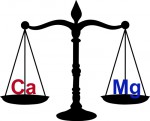 Of course calcium is vital
Of course calcium is vital
Don’t get me wrong, Ca is a critical element and neither Ca or Mg can function properly without eliciting a reaction from the other. The problem is, a vast amount of enzymes critically depend on a sufficient amount of intracellular Mg and too much Ca will have a detrimental effect on those enzymatic reactions. Our 37.2 trillion cells only work well if they have an abundance of Mg within them. Mg resides mainly inside our cells and Ca is mostly kept outside, unless needed temporarily for specifics like the fight-flight response.
Calcium aids the dying process
Ca is essential for muscle contraction but excess Ca can lead to serious problems. Think of your heart contracting without relaxing, your muscles going into cramp, constricting of your airways, constriction of your blood vessels, thickening of your blood. All this will happen without enough Mg to balance and keep Ca out of the cells. Even in rigor mortis, it is the Ca rushing into the cells when Mg drains out, that causes the stiffening of the body. Ca is essential but can be deadly.
This is why Mg deficiency adversely affects so many different areas of the body and hence can cause such a multitude of health problems, some of which are life threatening, like cardiovascular disease, syndrome X, diabetes and various conditions affecting the brain such as dementias.
Excess Ca will migrate!
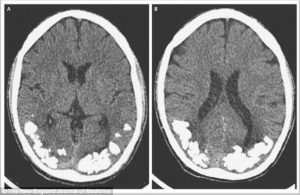
Excess Ca will actually migrate to parts of your body where it doesn’t belong. It can hang on to plaque and stick it to your artery walls, it can migrate to your kidneys and cause kidney stones. It can weaken, yes weaken, your bones. Ca is essential for good health and strong bones but it won’t do the job if Mg isn’t there to control it. Ca without Mg produces chalk-like bones. Think of Mg as the glue that holds the Ca together to make your bones resistant to fracture, durable and strong. Mg actually keeps Ca dissolved in your bloodstream, your heart, brain, kidneys and all other tissues. Things start getting sticky without it!
How much Ca have you got lingering?
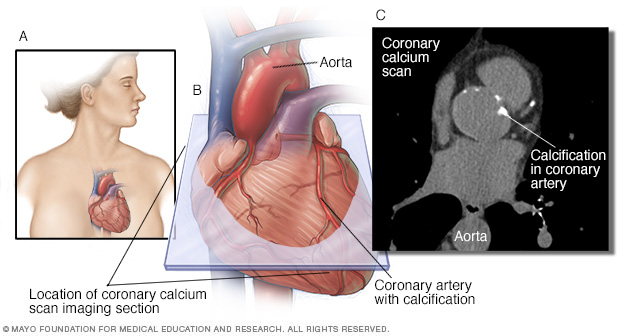
Research proves that excess Ca will be deposited in soft tissue and cause calcification. Atherosclerosis (hardening of the arteries), hypertension, heart disease, fibromyalgia, tooth decay, breast tissue calcification. All muscles contain more Mg than Ca, or they should do and this includes the heart and blood vessels.
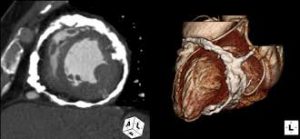 Calcium encircling the heart
Calcium encircling the heart
This picture shows you just how much damage excess Ca can do to your body. This is the ‘eggshell’ effect with Ca encircling the heart. Calcification of the arteries and heart is life threatening. Coronary Calcium Scans are used to give an indication of how serious a heart condition is. A ‘Calcium Score’ is allocated to the patient depending on how much arterial calcification is found with the CT (computed tomography) scan. The higher the score the worse the problem.
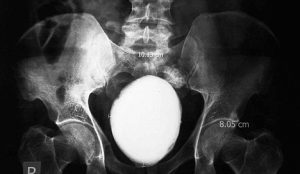 Bladder and kidney stones
Bladder and kidney stones
Ca deposits in the bladder can cause rigidity and lowering of capacity, apart from the obvious pain, distress and frequent urination. Look at this image showing a huge bladder stone suffered by a 52 year old male. It weighed ½ kg!
This is serious!
This is serious stuff with this calcification within your body causing all kinds of conditions not least Coronary Arterial Disease (atherosclerosis). It is beyond me why doctors don’t advise about the dangers of excess Ca and a deficiency of Mg. They already know about coronary calcium scans and why they are done so why is this fundamental mineral imbalance not addressed?
Our evolution regarding Ca and Mg.
Over the past six or more millenia, man evolved in a Mg rich environment which was poor in Ca. To survive, the body developed ways of conserving Ca and those mechanisms are still with us. Now, because of our modern diet which contains much junk food, sugar, sodas and artificial sweeteners and a plentiful supply of Ca, the reverse is the case.
The false idol
Our attention has been focussed on the ‘VIP’ of minerals, the ‘star’ Ca. We have been lulled into a false sense of security by taking a good amount of this ‘megastar’ of minerals. This has been exacerbated by the misleading advertisments from food moguls and the medical profession alike who seem to have no concept of the importance of mineral balance.
 A doctor’s lot
A doctor’s lot
You can’t really blame the medics because vitamins and minerals are not even on the curriculum of medicinal studies. Doctors are taught about diseases, illness and the sick body, not wellness. Their studies are somewhat controlled by the drug companies who want to control your illness, not cure it. Curing a disease does not keep the funds coming in to pay for the research and keep the coffers full. A drug would not be worth the expense if it was only used a few times and then was unnecessary because it cured the patient. Don’t forget, big pharma is just another large consortium of several companies. They are just businesses and profits are the name of the game, even if it’s at the expense of the best way to treat your condition.
Magnesium is harmless, natural and vital
Mg is a completely natural and harmless element. It has no side effects and it has grown with us as we have evolved throughout the millennia. We are now disregarding this vital nutrient at our peril. How many people over how many years have suffered unnecessary heart attacks, strokes, heart arrhythmias, migraines, kidney stones, gall stones, osteoporosis, pre-eclampsia, depression, cerebral palsy, raynaud’s disease, glaucoma, cataracts, infertility, insomnia, diabetes and died before their time?
 Be careful of hidden Ca!
Be careful of hidden Ca!
How many of you consume antacids. What about ‘tums’, ever had them? Most antacids will have copious amounts of ‘Calcium Carbonate’ (CaCO3) which is in fact just chalk. Tums is particularly bad for you. The daily dosage allows you to consume 3000mg of CaCO3. This is a massive amount of Ca and no way will the body use it all. Apart from that, the manufacturers make tums look like a bag of sweets with such adverts as ‘chewy delights’ ‘soft & delicious’ and ‘very cherry’. Ideal to entice young children.
Take control!
Seeing as your doctor won’t advise you, how about taking your health into your own hands. Supplementing with Mg can help so many diseases and it is harmless and at the same time vital. Research confirms that the majority of the population is deficient in this mineral. Mg Chloride solution is easy to take on a daily basis by just putting it in your daily water. Mg Citrate powder is ideal for those who have a sluggish digestive system, often the case with a Mg deficiency. It is also great for kids as the powder is tasteless and can be put into food. Being a powder, dosage is easily controlled. If you want to up your Mg levels through food take a look at foods with high magnesium. There is also the alternative method of supplementation by way of topical magnesium. The molecule of Mg Chloride is so small it is easily absorbed through the skin.
Dump the junk
Do yourself a big favour, start taking a Mg supplement. Eat plenty of the foods that are more magnesium rich and supplement with a good quality Mg. This is necessary because it is so difficult to obtain all your Mg needs through food alone. A ratio of 1:1 for Ca and Mg should be strived for, but this is nigh on impossible with just food intake.
 I would be very pleased to receive your comments on this subject. Your life experiences, tips, advice and insights, can really help others who need support and guidance.
I would be very pleased to receive your comments on this subject. Your life experiences, tips, advice and insights, can really help others who need support and guidance.
Spread the word!

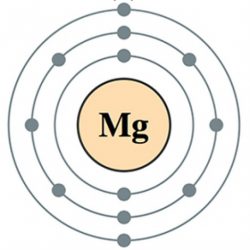
This article is a real eye opener. Like you said, if you pay attention to all of the advertisements, you would think you need as much calcium as you can get.
I wonder why companies don’t focus more on magnesium? I’m not big on taking supplements but I am going to check out your page that talks about foods that are high in magnesium. Thanks!
Thanks Jeremy for your comments. If you do decide on a Mg supplement just be sure it is of good quality and not the cheaper Mg oxide which is only around 4% bioavailable. Mg Chloride solution and Mg Citrate powder are the better choices IMHO. Good health to you. Ches
Wait… what?? This is the most eye-opening article I’ve read today!
Me and my girlfriend went for bone density check last year and we were advised by the doctor to take in calcium supplement to preserve our bone density. For me it was due to excessive caffeine intake that affected the lost of calcium, while for her it’s a woman’s thing.
We had our Ca supplement daily but never thought of Mg at all! I’ll definitely share this article with her and consult our family doctor again on this matter. Your article really saved us! Thanks!
Gary, if you go back to the doctor who told you to take calcium in the first place, what do you think he’ll say. “keep taking the calcium” Doctors know less than you do about nutrition. Believe me, if you start taking a good quality magnesium supplement now and drop the calcium supplementation, you will be doing your bones and your overall health a favour. Have another look at that coronary calcium scan. This could be happening to you now because of excess calcium in your body. Check this 2 minute video out https://www.youtube.com/watch?v=wlJthZtS4l0 by Dr Thomas Levy and start the change now. To your future health, Ches
Great article on the importance of magnesium. I didn’t know that it is harmless if more than what’s needed is taken!
As a one-time sufferer of Chronic Fatigue (the extreme form of fibromyalgia) and insomnia, I found the magic of magnesium! It helped me overcome those problems. Your article and information on other diseases that a deficit of this important nutrient can cause is a great reminder for me as I age.
Thanks for some terrific info. I will follow your posts to stay current!
Your comments are much appreciated Rori and I’m so pleased that you have your CFS and insomnia under control with magnesium. Please spread the word about magnesium and help other sufferers of CFS fibromyalgia and insomnia. There’s nothing more compelling than hearing from someone who has found the answer to their condition. Good health to you and yours. Ches
Thank you so much for writing this post! I just recently wrote a post myself on how magnesium deficient we are as a society. I did not realize all of that information on calcium though. This is very insightful and good to know for me and my children! Thanks again!
I enjoyed reading your site. Very interesting information about mg. Going to read more of your site about it. Site is very well presented., simple to read and not confusing. Thanks for sticking up for us seniors Some posts don’t have an ending or closing, also what is helpful for migraines? I couldn’t find any links on your post, internal or external. Well done, but maybe space your paragraphs more. Success in 2016. Deanna
Hi there Deanna and thanks for taking the trouble to read the article. I’m please you found it informative and I will definitely take on board what you say about paragraph spacing. I did have one link but I must admit I should have had a few more internal ones. To make up for it, here is a link which may interest you about migraines: http://magnesiumandhealth.com/magnesium-deficiency…
Have and happy and healthy 2016! Ches Power
Hi Chessie,
This is an excellent post!
I have learned a lot from this article until now I was unaware of how important magnesium is for our health.
As I am a diabetic I am going to read more about this subject and start incorporating more magnesium into my diet!
That is so good to hear Maureen. Magnesium (Mg) is the forgotten mineral and so many people would benefit from taking it. If you want to know what foods have the most Mg in them please go to – http://magnesiumandhealth.com/foods-with-high-magn…
I’m sure you will feel the benefit within just a few days, when you start taking Mg. Good luck to you and good health. Ches Power
Wow great stuff! This is critical information for people to know for their overall health. There is so much health research in our modern society and its crazy how many people are still behind as shown in the RDAs you mentioned. I even have a degree in kinesiology and not sure that I even learned this information. Thanks!
Hi there Luke and it’s nice to hear from you again. Isn’t it amazing how such important information gets left out of the curriculum of the medical profession. I have not heard of ‘kinesiology’ and had to look it up. What a fascinating subject. You’re right, it’s the RDAs that are giving a bum steer to those who are doing their best to look after their own health. It definately needs to be upgraded. Thanks for the comment. Ches Power
Hello Chessie, you have a great website with plenty of information about such an important mineral: magnesium.
I think that nowadays there is still not enough information about it. As you told in your article, calcium is in the spotlight.
Nobody cares what happens with our bodies, when we take calcium too much and our diet is low in magnesium. From the other side, calcium supplements are various. Some of them do not reach our cells and they end up in a place, where kings walk. I mean the toilet.
Your article shows reasons why we do need to choose the right brand of calcium and why we need to take magnesium.
You do a great job giving the public so much valuable information. Our health is the most important asset.
All the best, happy writing, Nemira.
Hi Nemira and thanks for reading the post. You seem to be well clued up on the Mg/Ca balance I’m gratified to know. I think this imbalance is a real problem which many people are unaware of it. It is so important to keep up Mg levels to counteract the abundance of Ca which most people consume. Also, they are often unaware of it because of so much fortification of Ca in our foods. It is very rare to come across fortification of Mg by the food manufacturers. More about this imbalance, which can be very threatening to our health, can be found at http://magnesiumandhealth.com/calcium-and-magnesiu…
Good luck and keep healthy!
Best wishes, Ches
Hi,
Thanks to your post I have a better understanding when it comes to calcium supplements. I’m not sure I will be using them, but I will continue to find and eat calcium rich foods. Your information is interesting and well laid out. I love the imagery on your site. Thank you very much.
Thanks for reading my post Carol and I’m gratified to learn that you’re keeping an eye on your calcium foods. Also please make sure your Mg intake keeps up with the Ca. You will find a list of Mg rich foods here Foods With High Magnesium
Best wishes, Ches